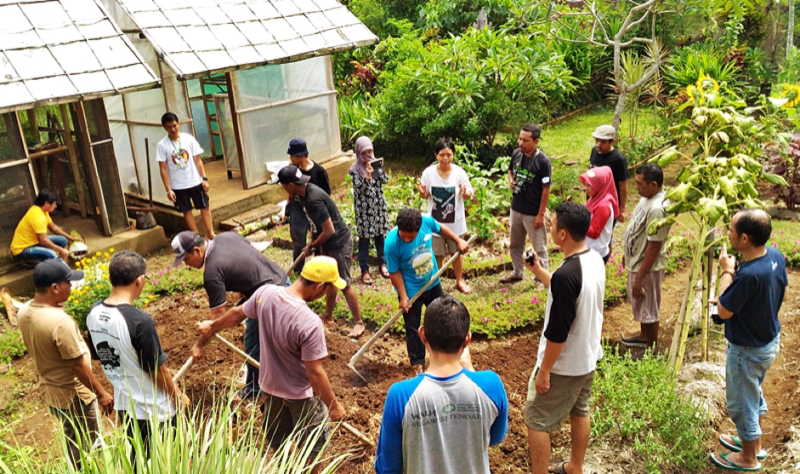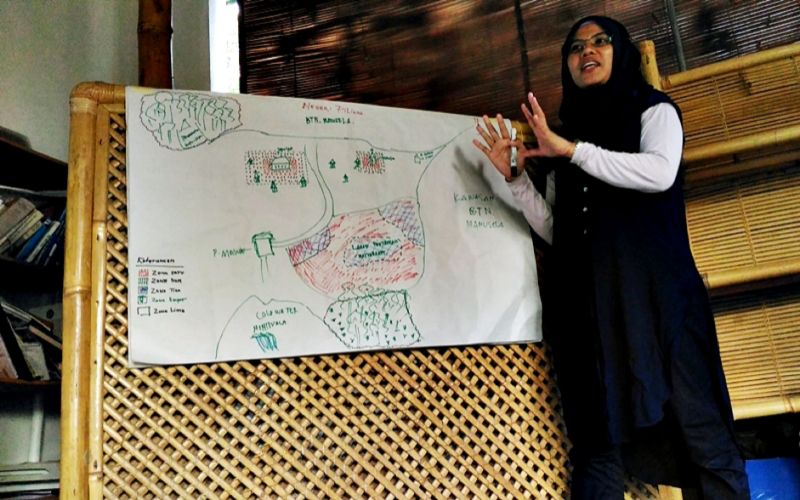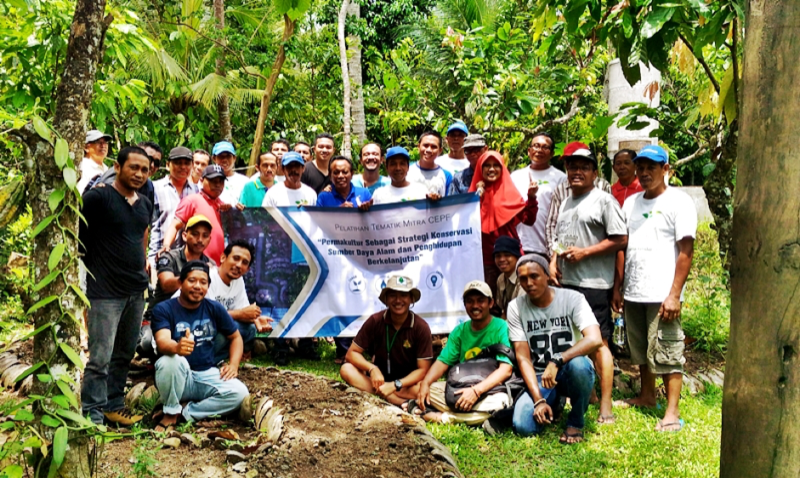Permaculture As A Strategy For Natural Resources Conservation and Sustainable Livelihoods
It was the training title facilitated by IDEP Foundation since 6-10 November 2017 at IDEP Foundation Training Center. The training was organized by Penabulu Foundation and IDEP Foundation with the support of the Regional Implementation Team (RIT) of Burung Indonesia and the Critical Ecosystem Partnership Fund (CEPF).

Participants were facilitated to learn about how useful the spiral plot is at IDEP’s demosite (Photo: Edward Angimoy)
A number of organizations, which have so far been engaged in sustainable and community-based management of natural resources, are among the participants. They are Yayasan Tunas Jaya (based in Manggarai, East Nusa Tenggara), Wahana Tani Mandiri (based in Maumere, East Nusa Tenggara), Yayasan Panorama Alam Lestari (based in Poso, Central Sulawesi), Perkumpulan Salanggar (based in Banggai, Central Sulawesi), Perkumpulan Sampiri (based in Sangihe Island, North Sulawesi), Lembaga Partisipasi Pembangunan Maluku (based in Ambon, Maluku), and Yayasan Pengembangan dan Pemberdayaan Masyarakat (based in Ambon, Maluku), and Yastra Maluku (based in Ambon, Maluku)
To date, cited from Mario Ginting of the Penabulu Foundation, many important areas for biodiversity are put under increasing pressure due to unsustainable using of natural resource. Forest clearance for plantations, land burning, and excessive use of chemicals are the most common causes of both natural and non-natural ecosystem degradation. On the other hand, an extensive pattern of natural resource utilization results in less than optimal output. If it goes deeper, then one of the main causes of the phenomenon is the limited access of people to knowledge, skills, and facilities to managing resource that is not only productive but also sustainable.
In such an alarming situation, permaculture as a model of eco-friendly community-based natural resource management can be an alternative solution, both small and large scale. With the principle of utilizing natural resources wisely and fairly, permaculture becomes a strategy of natural resources conservation while simultaneously making sustainable livelihoods a reality.

Na’am Seknun, a participant from Ambon, while presenting Permaculture Zonation Map plan as her discussion group has made to be adapted to one village her organization served (Photo: Edward Angimoy)
This training was expected to achieve two goals. First, to build the capacity of participants and the communities they support about the permaculture best practices that support the species and habitats conservation in the Wallacea Region, including how to link it to the sustainability of surrounding biodiversity. Second, to train participants and the communities they support in integrating permaculture into village government policies and programs to ensure the sustainability of their works.
During five days of training, participants were facilitated to learning about the basic concepts and principles of permaculture, permaculture connectivity with biodiversity conservation, permaculture integration in village level planning, reflection on participants programme, and networking. And in accordance with the principles of permaculture, there were always series of discussion in each session to encourage participants to explore local potentials in their working areas. Beside of “in class" sessions, participants were also facilitated to directly practice permaculture materials at the demo site around the IDEP Foundation's Training Center area. They were even also invited to visit Yeh Embang Kauh village, located in West Bali to learn more closely about permaculture practices related to sustainable natural resource management which has initiated by Base Bali, a local community partner of IDEP Foundation, and its integration to village programmes.

Participants were visiting Yeh Embang Kauh village to meet and learn from Base Bali and their community partners (Photo: Edward Angimoy)
With the knowledge, skills, and internalisation of the principles of permaculture, participants formulated the follow up workplan of their each organization toward each community that they support at the end of the training. Local capacities considered as a priority in this session. Based on comments during the training, participants expressed their acknowledgement of the benefits of this permaculture training related to their works. They also hope that the network which has been formed during the training would be remaining as an important forum for sharing, especially when it is related to permaculture as a strategy of natural resources conservation and sustainable livelihoods.
Subscribe to IDEP Newsletters
Give a gift that will change lives. 100% funds charity projects.
|






